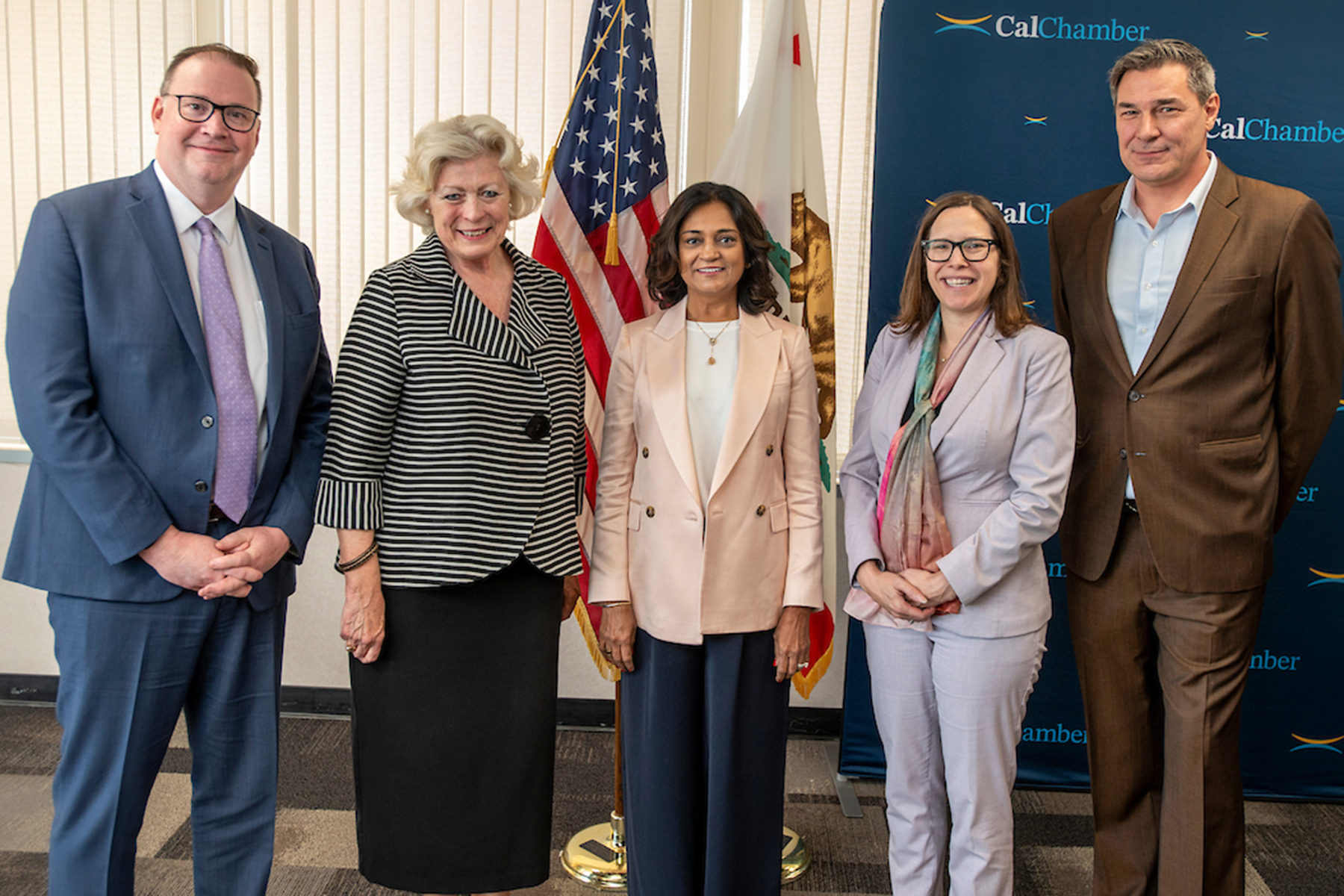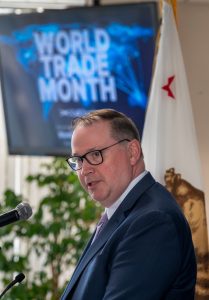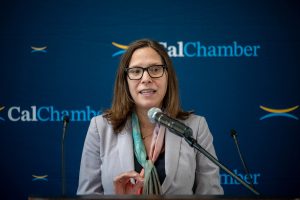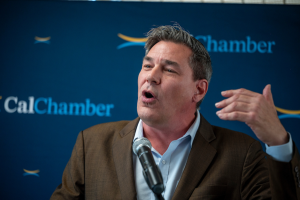Nearly 200 attendees gathered last week for the California Chamber of Commerce International Trade Forum, which featured presentations on U.S.-Taiwan ties, federal trade initiatives, and the U.S. economy.
The May 8 event brought together representatives from the business community, CalChamber Board members, representatives of the California consular corps and foreign economic partners, plus representatives of foreign, state, local and federal governments.

This year’s forum speakers were:
- James Golsen, Deputy Director General, U.S. Foreign and Commercial Service, U.S. Department of Commerce;
- Laura Rosenberger, Chair, American Institute in Taiwan (AIT); and
- Christopher F. Thornberg, Ph.D., Founding Partner, Beacon Economics.
During the forum, Golsen presented President and CEO of JQ American Corporation Jamal Qureshi with the prestigious U.S. Commercial Service Export Achievement Certificate for his export sale to the Sultanate of Oman. In attendance was the Commercial Attaché Ali Khadra from the Embassy of the Sultanate of Oman in Washington, D.C.
James Golsen

After a welcome by CalChamber Vice President of International Affairs Susanne T. Stirling, James Golsen gave attendees an overview of the U.S. Department of Commerce (DOC) and highlighted the department’s key global trade initiatives.
The DOC currently has 95 embassies and consulates globally, covering 95% of world gross domestic product (GDP), Golsen said. The department offers commercial officers and commercial specialists to help solve problems for U.S. companies, and to work with companies around the world to invest in the United States.
Some DOC initiatives currently underway include:
- Indo-Pacific Region: With 60% of the world’s population, this region is projected to be the biggest contributor to global economic growth, Golsen said. DOC offices in the Indo-Pacific region expand trade opportunities for U.S. companies throughout California and the United States.
- China: China is the third largest export market for the United States, directly supporting an estimated 750,000 U.S. jobs. Golsen said the U.S. has a strong U.S. Commercial Service team on the ground, working for consulates, as well as the Embassy in Beijing. The team works to promote trade and investment in targeted sectors, such as consumer goods, environmental technology, pollution control, and health care.
- Western Hemisphere: The United States is the top trading partner for more than two-thirds of the Western Hemisphere. Golsen said the U.S. is not complacent with that relationship and wants to continue to challenge and engage with its partners throughout the region. Last summer, the U.S. opened a new commercial office in Guyana. This year, the U.S. has been leading high-level trade delegations to Colombia, Costa Rica and Panama; the visits are designed specifically to meet the exporting needs of U.S. small- and medium-sized businesses.
- Middle East and Africa: Golsen said that while there are many challenges in the Middle East, there also are many opportunities. DOC staff is working on the ground there to access those opportunities for U.S. companies in the region. In Africa, the U.S. invested recently in opening two new offices, one in Nabi Shan, and one in Lusaka, Zambia.“The U.S.-Africa partnership is a crucial aspect of amplifying the continent’s transformation across several sectors — clean technologies, health care, climate, smart agriculture, and the creative industries,” he said.
- Europe and Eurasia: The DOC is tackling the next generation’s challenges through the US-EU Trade and Technology Council, which is working to align transatlantic approaches across issues, including export controls, secure supply chains, and artificial intelligence.Throughout Europe and Eurasia, the DOC is working with U.S. allies in solidarity with Ukraine to help prepare for the reconstruction of that country following the cessation of hostilities. The DOC office in San Francisco is organizing a rebuild Ukraine business event aimed at demystifying conducting business in Ukraine. The June 5 event will highlight the current needs of the country and opportunities for U.S. business through multilateral development banks.
Laura Rosenberger

The forum’s second speaker was Laura Rosenberger, who spoke on how U.S.-Taiwan economic ties contribute to the prosperity and resilience of the United States and Taiwan.
A copy of her remarks can be found here.
From the foundations of Silicon Valley to today’s cutting-edge industries and research, California and Taiwan continue to lead the way in business and tech, Rosenberger said.
About 90,000 U.S. jobs supported by the trade and investment of Taiwan-affiliated companies are in California, one-third of the nationwide total. California has the second highest value of exports to Taiwan among U.S. states, and Taiwan is the 11th largest source of foreign direct investment (FDI) in California through foreign-owned enterprises.
With a highly educated population of about 23.5 million, Taiwan is an outsized contributor to the global economy. It is home to more than half of the global foundry business, and famously produces more than 60% of the world’s semiconductors, and about 92% of advanced chips. It is the eighth largest economy in Asia and 20th largest in the world by purchasing power parity.
Last June, AIT and the Taipei Economic and Cultural Representative Office (TECRO) signed the first trade agreement under the U.S.-Taiwan Initiative on 21st Century Trade, Rosenberger said. The agreement deals with issues important to U.S. business, including reducing red tape and streamlining customs procedures, and facilitating investment and economic opportunities in both markets. Another negotiation round in Taipei earlier this month worked toward a second trade agreement in the areas of agriculture, labor and the environment.
AIT’s office in Taipei has a Foreign Commercial Service team from the U.S. Department of Commerce that helps American companies export to Taiwan and Taiwan companies find investment opportunities in the United States, she said. On the export side, they cover a variety of industry sectors but are strategically focused on exporting cybersecurity and energy solutions, semiconductors, next-generation telecommunication technologies, and drones.
In connection with the CHIPS Act (the 2022 law creating incentives to boost U.S. semiconductor production), the United States is welcoming leading-edge semiconductor manufacturers from Taiwan to manufacture in the U.S. Through the CHIPS Act, Rosenberger said, billions of dollars of private sector semiconductor investment is helping to create approximately 6,000 direct manufacturing jobs, and tens of thousands more in construction and other indirect jobs.
“This investment and trade with Taiwan is not only a force for prosperity, but a force for peace and stability, too. Through our expansive economic partnership, we are advancing our shared vision for a more resilient and interconnected Taiwan economy. As more international, national, local, and industry-level actors increase their engagement with Taiwan, their investment, trade, innovation, and people-to-people ties form a strong network of actors who have a stake in Taiwan and Taiwan’s continued success,” she said.
“This is not an effort that governments can achieve alone,” she emphasized. “This focus brings with it business opportunities in key sectors, such as in energy infrastructure, communications, and information technology sectors that need to be strengthened, hardened, and generally rendered more resilient against shocks. There’s a natural synergy here: Taiwan has goals for resilience, and the private sector can help achieve them.”
Christopher Thornberg

The forum’s final speaker was Christopher Thornberg, who discussed how social narratives and the reality shown by data can differ.
“This disconnect of our political policy narratives from fundamental economic realities,” he said, “is creating the inability to compromise over basic legislative needs.”
Thornberg’s presentation is available here.
As an example, Thornberg pointed to headlines a year-and-a-half ago that predicted a recession was imminent. There was no recession, he noted. The inflation and rising interest rates being cited by recession worriers were symptoms of an “overheating economy” caused by excessive stimulus in response to the pandemic.
Lost GDP from the pandemic closures was $1.2 trillion, he said, but the federal fiscal stimulus totaled $6 trillion, roughly $50,000 in stimulus per household.
Compared to the rest of the world, U.S. inflation over the last five years — about 3% annually — is not a big number, Thornberg said. And while surveys showed respondents were concerned about the impact of inflation on their day-to-day lives and said they were spending less, such as at restaurants, the data showed that spending at restaurants increased 40%, he pointed out.
For California, Thornberg said, a fundamental issue remains a lack of housing. Housing and rental vacancy rates are relatively steady, but the number of California households has been rising since the pandemic, while the number of persons per household has declined, a sign that people are spreading out.
For both the nation and California, he said, a big problem is a lack of workers. U.S. population growth has been slowing due to declining birth rates and there are 1.4 job openings for every job seeker.
Facing domestic labor shortages, companies are turning to “nearshoring” with Mexico. Thornberg said the data shows a huge amount of foreign direct investment (FDI) going into the Mexican economy, even from Chinese manufacturers. Mexico is the largest exporter to the United States.
Thornberg closed with the comment that the success of humans as a species depends on the ability to be “champion cooperators” and that the unifying element is “narratives that bind us together.”
Staff Contact: Susanne T. Stirling

